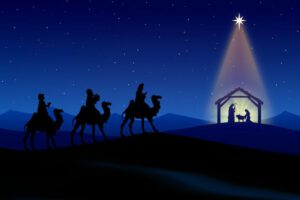Today’s First Reading (Is 60: 1-6) delightfully addresses Jerusalem. Isaiah proclaims the good news that the city will rise and shine as soon as it catches sight of the Lord. Whatever may happen to the world, the Lord’s glory will been seen upon the holy city. Kings and nations will fall prostrate before her; her diasporic children will return, and all roads will lead to Jerusalem.
That is unmistakably the good news of salvation that the world will receive when the Divine Babe is born in Bethlehem, just 8 km away from the capital. Darkness or hopelessness may cover the earth and even thicker its peoples, but Jerusalem shall be covered by a multitude of camels as harbingers of hope; they will come from Midian and Ephah (both in present-day Saudi Arabia) and Sheba (now in Yemen and Ethiopia); they will bring gold and frankincense and proclaim the praise of the Lord.
Among those rare words of radiance, resplendence and rejoicing, it is anybody’s guess why Isaiah had no place for myrrh. In ancient times this resin, used for embalming, was almost as precious as gold. Why did the Magi offer it to the newborn? St. Augustine believes that Jesus received “Gold, as paid to a mighty King; frankincense, as offered to God; myrrh, as to one who is to die for the sins of all.”

What Isaiah had prophesied did happen. As today’s moving Gospel text (Mt 2: 1-12) tells us, three wise men of the East – whose origin, names and professions remain a mystery – came on camels, looking for the king of the Jews from the Royal House of David. He came as spiritual king, and this made Herod the temporal king jittery. Like all devious men, he tried to charm the threesome, but failed.
The chief priests and scribes whom Herod had contacted were fully aware that Bethlehem of Judea was destined to receive the Messiah. St Matthew says that the king was troubled “and all Jerusalem with him”. They are the same parties that would later put Him to death.
Meanwhile, with no other GPS but the star to guide them, the Magi followed its trail “till it came to rest over the place where the Child was born.” And what is more, after they had fallen prostrate, worshipped Him, and offered their precious gifts, “they departed to their own country by a different way.” Good old Isaiah had foretold: “And nations shall come to your light, and kings to the brightness of your rising.”
By relating that episode, the Gospel writer shows how the One that the Jewish authorities rejected, the pagans came to adore… Jesus Himself said no one is a prophet in his own land. Very often those to whom much is given and from whom much is therefore expected, give very little in return. If the Son of God could be treated thus, what right do you and I have to feel disheartened when a friend or relative gives us the cold shoulder or a thumbs-down?
So be it. God is not mocked, and whatever one sows, that will he also reap. God’s plans will never be frustrated; He will use others as His instruments. As St Paul points out in the Second Reading (Eph 3: 2-3, 5-6), the Gentiles are now “fellow heirs, members of the same body, and partakers of the promise in Christ Jesus through the Gospel.” Israel’s loss became the world’s gain.
Whereas at Christmas God humbled Himself, today at the Epiphany He is manifested as God and Universal King together with His Spouse, the Church (the New Jerusalem). He is no longer the Old Testament’s Messiah expected to come for one race and country alone, but the Messiah awaited by the peoples of the world. Let us manifest Him through our words and actions – through our threefold baptismal vocation as priest, prophet and king.